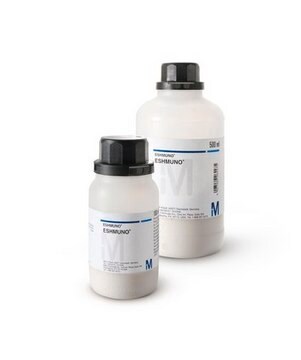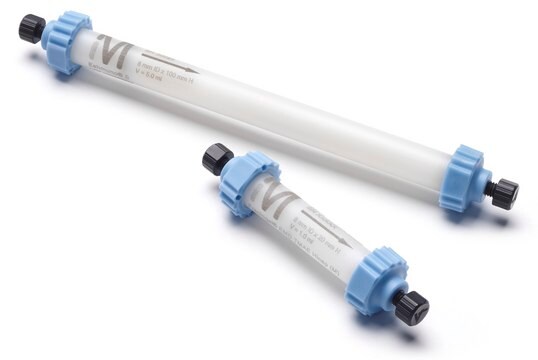Key Documents
Safety Information
1.16884
Fractogel® EMD DMAE (M)
Synonym(s):
Fractogel® EMD DMAE (M)
About This Item
Recommended Products
Quality Level
ligand
diethylaminoethyl
description
weak anion exchanger, suspension in 20% ethanol and 150 mM NaCl (40-90 µm)
sterility
sterile (Caustic Stable)
product line
Fractogel®
form
resin
parameter
170 cm/hr flow rate
8 bar max. pressure
matrix active group
methacrylate
mean particle size
40-90 μm
capacity
100 mg binding capacity (BSA/mg of resin)
transition temp
flash point 35 °C (calculated)
density
1.430 g/cm3
bulk density
1000 kg/m3
application(s)
gene therapy
recombinant protein
vaccine development
separation technique
weak anion exchange
storage temp.
2-30°C
Looking for similar products? Visit Product Comparison Guide
General description
Features and Benefits
- Excellent binding to large viruses and plasmid DNA
- Homogenous binding with high selectivity and purity
- Lower elution volumes for the highest purity levels
- Compatibility with 2.5 % (v/v) aqueous benzyl alcohol containing 150 mM NaCl storage solution
Due to the titration behavior, the ion exchange capacity can be used from pH 2 to pH 9.5. The separation of proteins is based on reversible electrostatic interactions between the negatively charged regions of the proteins′ surface and the support. Proteins are retained efficiently on Fractogel® EMD DEAE when the pH of the buffer is about 1 unit above their isoelectric points (pl).
The strength of the binding depends on the following:
- the buffer system
- pH value of the buffer which determines the surface charge of the protein
- the degree of the ionization of the functional groups of the exchanger
- the concentration of the counter ions
- the charge density on the support (protein binding capacity)
Packaging
- 1.16884.0100: Fractogel® EMD DMAE (M) Resin 100ml
- 1.16884.0010: Fractogel® EMD DMAE (M) Resin 10ml
- 1.16884.0500: Fractogel® EMD DMAE (M) Resin 500ml
- 1.16884.5000: Fractogel® EMD DMAE (M) Resin 5L
Analysis Note
Microscopic evaluation: Uniform spherical particles,no agglomerates, no fines
Extractable matter (water): ≤ 0.03 %
Cerium: ≤ 1 µg/g
Pressure drop(column: ID=1.6 cm, L=10 cm at 5 ml/min): ≤ 1.0 bar
Particle size (d10): 37 - 45 µm
Particle size (d50): 48 - 60 µm
Particle size (d90): 63 - 77 µm
Colony forming units (TAMC + TYMC): ≤ 100 CFU/ml
Endotoxins: ≤ 1.00 EU/ml
Protein binding capacity (bovine serum albumin): 80 - 120 mg/ml
Functional test (b:a): ≤ 0.25
Functional test: Separation of conalbumin and human serum albumin
Legal Information
Not finding the right product?
Try our Product Selector Tool.
Signal Word
Warning
Hazard Statements
Precautionary Statements
Hazard Classifications
Flam. Liq. 3
Storage Class Code
3 - Flammable liquids
WGK
WGK 3
Flash Point(F)
95.0 °F
Flash Point(C)
35 °C
Regulatory Listings
Regulatory Listings are mainly provided for chemical products. Only limited information can be provided here for non-chemical products. No entry means none of the components are listed. It is the user’s obligation to ensure the safe and legal use of the product.
FSL
Flammable liquids
Type 2 petroleums
Hazardous rank III
Water insoluble liquid
ISHL Indicated Name
Substances Subject to be Indicated Names
ISHL Notified Names
Substances Subject to be Notified Names
Certificates of Analysis (COA)
Search for Certificates of Analysis (COA) by entering the products Lot/Batch Number. Lot and Batch Numbers can be found on a product’s label following the words ‘Lot’ or ‘Batch’.
Already Own This Product?
Find documentation for the products that you have recently purchased in the Document Library.
Articles
See case study examples of how to optimize chromatographic purification of plasmid DNA for Biopharmaceutical Applications.
Influenza vaccines are commonly made using egg-based and cell-based manufacturing strategies. Find step-by-step information on the manufacturing process for each method.
A custom-designed cost model is used to explore the economics of vaccine manufacturing across several different modalities including mRNA. The model enables greater process understanding, simulates bottlenecks, and helps to optimize production efficiency.
Learn more one the attenuated viral vaccines manufacturing process: cell culture, clarification, nuclease treatment, chromatography, and sterile filtration.
Related Content
A templated process produces live vector vaccines. Challenges: yield loss, filtration, aggregation, scaling. Collaboration overcomes manufacturing hurdles.
Tailored viral vaccine manufacturing addresses virus-specific challenges through collaboration.
This technical article breaks down the adenovirus vaccine manufacturing process and provides a case study on developing an accelerated and cost-effective single-use adenoviral vector vaccine.
Our team of scientists has experience in all areas of research including Life Science, Material Science, Chemical Synthesis, Chromatography, Analytical and many others.
Contact Technical Service



